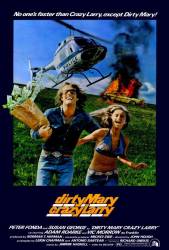Revealing mistake: When the Charger hits the red truck, the truck turns over with the assistance of a 'pipe cannon' (note the sudden eruption of white smoke from under the truck). This device is like a large gun, pointed down that fires a cylindrical wooden 'bullet' at the ground, and the pressure behind it forces one side of the truck upward, causing the flip. Evidence of its use is seen when the passing cop drives away and in the street is a perfectly circular 'dent' in the asphalt with a burn mark surrounding it. (01:12:50 - 01:16:20)
Suggested correction: A cannon roll uses a large device, usually a metal pipe that is pointed down, but it does not fire a "bullet" wooden or otherwise. It is just the force of the explosive charge focused downwards that causes the cars to roll over.
A cannon roll shoots out a wooden log to flip a vehicle, it's not just shooting out air.
This is just nonsense, a wooden log would be too dangerous to use, would be highly conspicuous on screen, and would take up room inside a vehicle.
Then you don't know how they use to do car stunts. It does take up room, but even modern methods do. Cars have to be modified heavily and of course it's dangerous, they're flipping a car with a driver inside. Film makers do everything they can to avoid the stunt car from being detected (just the same way they do everything that can to avoid a dummy being detected). Here's a article that talks about car stunts before the pneumatic flipper. Https://www.caranddriver.com/news/a15364815/the-inside-story-of-the-academy-award-winning-car-inversion-device-or-how-to-flip-cars-real-good/.
Bishop73 is right. For example, from Raiders of the Lost Ark: https://www.moviemistakes.com/picture6238.
Continuity mistake: After colliding with the red pickup truck,, the trio decide to take the car deeper into the walnut grove to hide out while repairing the front end of the car. An exterior shot starts on the left side of the car as it turns away from the camera and crawls away. The round side-marker light behind the '440' marking and the lack of reverse lights in the rear valance indicates this is a 1968 Charger that is wearing 1969 tail lights, poorly installed. This is the only scene in the film that uses this car in this configuration. (01:13:40)
Visible crew/equipment: When Deke is changing the tire on the Charger, you can see the camera man and light rigging reflected in the door of the car as the camera pans to Mary laying down on the trunk. (01:14:15)
Visible crew/equipment: When Mary leans into the Charger to turn off the CB radio, the multiple filming lights and moving crew members are visible reflected in the car door. (01:14:40)
Continuity mistake: When Deke stands up to defend Mary after Larry has pushed her down, a tire & wheel can be seen lying flat to Deke's left, very close to the car. When Larry walks away moments later, the tire/wheel is significantly further forward and left of the car despite nobody touching it. (01:15:00)
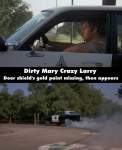
Continuity mistake: As the Charger emerges from the groves after repairs, it is spotted by the cop in the modified police car. The close-up of the cop beginning to smile shows that the insignia on the car door has only black outlines on the white door, yet all the shots after show it is properly filled in with gold. (01:19:20)
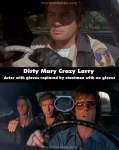
Continuity mistake: When the Charger emerges from the groves after repairs, it is chased by the 'Hot Rod' police car. Close-ups of the policeman show he is wearing black gloves, but shots from the Charger, looking rearward show a very obvious stuntman who is driving barehanded. (01:19:55)
Continuity mistake: While making a sharp left turn, the Charger is struck in the left rear quarter panel by the 'hot rod' police car, deforming that panel severely. But as the Charger again turns left onto a dirt road to 'powder' the cop's face, the panel is undamaged. The shots that follow next show the damage is back for the remainder of the film. (01:20:25)
Continuity mistake: At the end of the chase between the Charger and the 'hot rod' police car, they speed into an intersection and turn left. Just before the police car is struck by a gray station wagon, the Charger can be seen leaving the road surface, headed into the trees and grass while braking hard (the stunt driver took the turn too fast and overshot it). The shot changes and the Charger is seen speeding away on the pavement without having had time to turn around, to get back on the road nor to return to high speed. (01:22:15)
Continuity mistake: In various scenes, an odd pattern of scratches appears and disappears from the top portion of the car's driver's-side door. These are due to the car's use as a 'camera platform' during some scenes (like filming Larry through his own window), and the camera mounts have made the scratches. It is obviously not collision damage. Because the camera isn't visible in these shots, this is a continuity error, not a visible equipment error. (01:25:15)
Continuity mistake: During the chase against the helicopter, some exterior shots of the Charger show all its windows are fully open, but all interior shots (and a few exteriors) show the rear side windows are closed. (01:25:15)
Revealing mistake: When the helicopter is chasing the charger, in several shots, only the driver is visible in the charger when there should be three people. (01:25:30)
Revealing mistake: When the helicopter lands in the field due to lack of fuel, you can tell by the disturbed ground that the helicopter has landed there several times, or at least it was prepared ahead of time. (01:26:40)
Continuity mistake: When we see the train from the front just before the collision at the end of the film, the staircase on its front/right corner is already heavily damaged/crushed. Then, as the car is about to collide with the train, we see the train in a side view and these stairs are perfectly fine. The approaching front view was obviously filmed after the crash. Note the same damage is on the train in the film's opening shot (just before the credits and theme song start). (01:30:55)
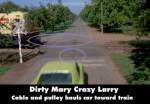
Visible crew/equipment: As the Charger races toward the railroad tracks, the view from above and behind the car shows a cable is pulling the car forward. The cable runs under the tracks (note the discolored pavement that crosses the tracks), then the cable emerges on the other side and turns left around a horizontal pulley. The cable disappears to the left where an off-screen truck is driving further to the left, pulling the car. (01:31:00)
Suggested correction: Actually the cable was attached to the train locomotive itself. That way they were able to measure the cable out that the car would be in the right place to be hit, without dealing with timing issues of getting two independent vehicles to be at the same place at the same time.
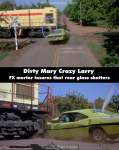
Visible crew/equipment: When the Charger hits the train, the shot from above and behind ends with the rear window shattering due to a very obvious mortar blast at the left/lower corner of the glass, which fires a white gaseous stream upward. It's seen again in slow motion from the side in the next shot as well (at the right side of the shot). (01:31:00)
